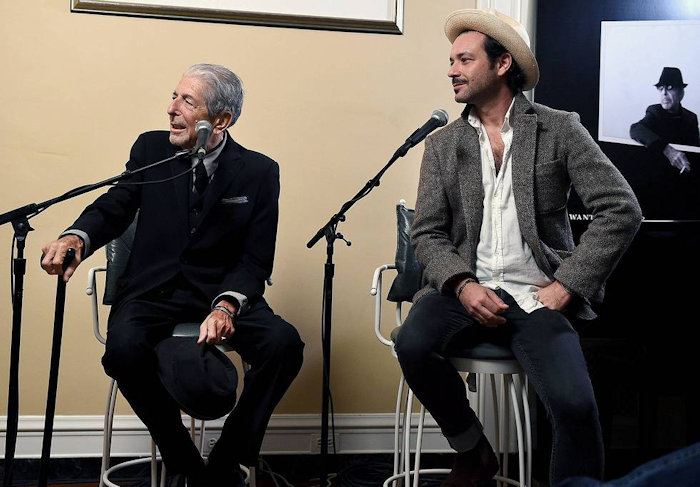THE FLAME: FOREWORD
by Adam Cohen

This volume contains my father's final efforts as a poet. I wish he had seen it to completion—not because it would have been a better book in his hands, more realized and more generous and more shapely, or because it would have more closely resembled him and the form he had in mind for this offering to his readers, but because it was what he was staying alive to do, his sole breathing purpose at the end. In the difficult period in which he was composing it, he would send "do not disturb" e-mails to the few of us who would regularly drop by. He renewed his commitment to rigorous meditation so as to focus his mind through the acute pain of multiple compression fractures and the weakening of his body. He often remarked to me that, through all the strategies of art and living that he had employed during his rich and complicated life, he wished that he had more completely stayed steadfast to the recognition that writing was his only solace, his truest purpose.
 | My father, before he was anything else, was a poet. He regarded this vocation, as he records in the notebooks, as some "mission from G-d." (The hyphen indicated his reverence to the deity; his reluctance to write out the divine name, even in English, is an old Jewish custom and is further evidence of the fidelity that he mixed with his freedom.) "Religion, teachers, women, drugs, the road, fame, money... nothing gets me high and offers relief from the suffering like blackening pages, writing." This statement of purpose was also a statement of regret: he offered his literary consecration as an explanation for what he felt was poor fatherhood, failed relationships, and inattention to his finances and health. I am reminded of one of his lesser-known songs (and one of my favorites): "I came so far for beauty, I left so much behind." But not far enough, apparently: in his view he hadn't left enough. And this book, he knew, was to be his last offering. |
As a kid, when I would ask my dad for money to buy sweets at the corner store, he'd often tell me to search the pockets of his blazer for loose bills or change. Invariably, I would find a notebook while going through his pockets. Later in life, when I would ask him if he had a lighter or matches, I would open drawers and find pads of paper and notebooks. Once, when I asked him if he had any tequila, I was directed to the freezer, where I found a frosty, misplaced notebook. Indeed, to know my father was (among many other wondrous things) to know a man with papers, notebooks, and cocktail napkins—a distinguished handwriting on each—scattered (neatly) everywhere. They came from nightstands in hotels, or from 99-cent stores; the ones that were gilded, leather-bound, fancy, or otherwise had a look of importance were never used. My father preferred humble vessels. By the early 1990s, there were storage lockers filled with boxes of his notebooks, notebooks containing a life of dedication to the thing that most defined the man. Writing was his reason for being. It was the fire he was tending to, the most significant flame he fueled. It was never extinguished.
There are many themes and words that repeat throughout my father's work: frozen, broken, naked, fire, and flame. On the back of the first album cover are (as he put it in a later song) the "flames that follow Joan of Arc." "Who by fire?" he famously asked, in a song about fate that wickedly made use of a Jewish prayer. "I lit a thin green candle to make you jealous of me." That candle was only the first of many kindlings. There are fires and flames, for creation and destruction, for heat and light, for desire and consummation, throughout his work. He lit the flames and he tended to them diligently. He studied and recorded their consequences. He was stimulated by their danger—he often spoke of other people's art as not having enough "danger," and he praised the "excitement of a thought that was in flames."
This fiery preoccupation lasted until the very end. "You want it darker, we kill the flame," he intoned on his last album, his parting album. He died on November 7, 2016. It feels darker now, but the flame was not killed. Each page of paper that he blackened was lasting evidence of a burning soul.
-Adam Cohen, February 2018
|

![[PREV PAGE]](but-prev.gif)
![[NEXT PAGE]](but-next.gif)
![[INDEX PAGE]](but-ndx.gif)
![[SUB INDEX PAGE]](but-subi.gif)
